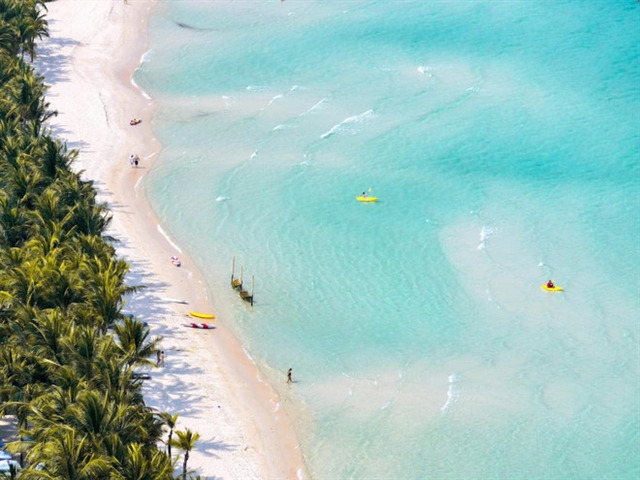Weather:
- Ha Noi 28oC
- Da Nang 28oC
- Ho Chi Minh 27oC
HÀ NỘI — With the fastest tourism rebound in Southeast Asia, three top destinations drawing international visitors, and a rising portfolio of high-end experiences, Việt Nam is no longer a hidden gem. It is now reshaping the region’s tourism map as a dynamic hub for luxury, discovery, and relaxation.
The journey from a "hidden treasure" to a "shining star" has not been short, but Việt Nam is now proving itself worthy of every accolade.
According to Bloomberg, Việt Nam has achieved an impressive 98 per cent tourism recovery rate post-COVID pandemic, outpacing both Thailand (87.5 per cent) and Singapore (86 per cent). This remarkable growth has positioned the country as the fastest-developing tourism destination in Southeast Asia.
In 2024, Việt Nam surpassed Singapore to become the third most-visited country in the region, welcoming 17.5 million international arrivals - just behind Malaysia with 25 million and Thailand with 35 million. The Economic Times also noted that Việt Nam has outpaced Thailand to emerge as the most beloved destination among travellers across the region.

The global trend of travellers choosing Việt Nam as their destination is gaining unprecedented momentum. According to statistics from Footprint Travel, Vietnam welcomed over 2.1 million international arrivals in January 2025 alone, a 36.9 per cent increase compared to the same period last year, surpassing even the pre-pandemic record of January 2020. Russian visitor numbers surged by more than 116 per cent, while major Western European markets like Germany, France, the UK, and Italy all recorded robust double-digit growth. Notably, arrivals from Northern Europe - a region known for its love of nature and sustainable travel - also climbed significantly, with Norway up 35.6 per cent, Sweden 31.8 per cent, and Denmark nearly 18 per cent.
Contributing to these impressive results are Phú Quốc, Hạ Long, and Đà Nẵng - three destinations that have stood out for their remarkable growth in international arrivals. Phú Quốc alone welcomed nearly 2.1 million foreign tourists in the first month of the year, reflecting a nearly 37 per cent increase year-on-year. Meanwhile, Đà Nẵng saw its international arrivals in Q1 rise by 42.1 per cent compared to the same period in 2024.
What these destinations have in common is the natural beauty of their beaches - a favourite among international visitors. While Mỹ Khê Beach in Đà Nẵng buzzes with sports and events, the powdery white sands and emerald waters of Kem and Sao Beaches in southern Phú Quốc offer postcard-perfect tranquility. In contrast, Hạ Long captivates with its UNESCO-recognised heritage bay, home to thousands of majestic limestone islets.

Beyond stunning landscapes, Phú Quốc, Đà Nẵng, and Hạ Long also boast fully integrated tourism ecosystems, making them more than just scenic getaways. These destinations offer a rich blend of world-class entertainment complexes and luxury resorts operated by globally renowned brands. A prime example is the Sun Paradise Land ecosystem in southern Phú Quốc, home to a series of remarkable experiences: the world’s longest three-cable gondola ride to Hòn Thơm Island, the beachfront VUI-Fest night market with over 50 vibrant stalls, the Kiss of the Sea show featuring the world’s largest sea screen, and dazzling fireworks displays every night of the year.
Đà Nẵng’s tourism offerings are just as compelling, seamlessly connecting mountain adventures to seaside luxury. At Sun World Bà Nà Hills, travellers can indulge in unique entertainment experiences atop the Bà Nà mountain, while premier beachfront resorts like InterContinental Danang Sun Peninsula Resort and Premier Village Đà Nẵng redefine coastal luxury with world-class hospitality.
Phú Quốc and Hạ Long are also emerging as top-tier destinations for the ultra-luxury travel segment - not just for leisure, but for life’s most important celebrations. According to the Times of India, an increasing number of affluent Indian families are choosing Việt Nam, especially Phú Quốc and Hạ Long, as the stage for their most extravagant weddings. With breathtaking natural backdrops, opulent accommodations, and expert event planning services, these destinations are proving that they are not only beautiful, but also impeccably equipped to host life’s most unforgettable moments.

In addition to its rich array of travel experiences, Việt Nam's rise on the global tourism map is also driven by flexible visa policies and an increasingly expansive air network that makes the country more accessible than ever. A streamlined e-visa system, along with selective visa waivers for citizens of numerous countries, is helping position Việt Nam as a friendly and easy-to-reach destination for international travellers.
The Straits Times has noted that airlines like Singapore’s Scoot have introduced new direct routes to emerging destinations such as Phú Quốc - once lesser-known, now brimming with potential - as global travellers seek out fresh, off-the-beaten-path experiences.
In 2025, Việt Nam's tourism scene is bursting with vitality and promise. Recognition from global media and travellers alike is not just a milestone - it’s a springboard toward the country’s ambition of becoming Southeast Asia’s leading destination for travel and leisure. A true gem, Việt Nam is now shining brighter than ever.
Looking ahead, the bigger picture reveals an even more ambitious goal: to become the second most-visited country in Southeast Asia by the end of this decade.— VNA/VNS


